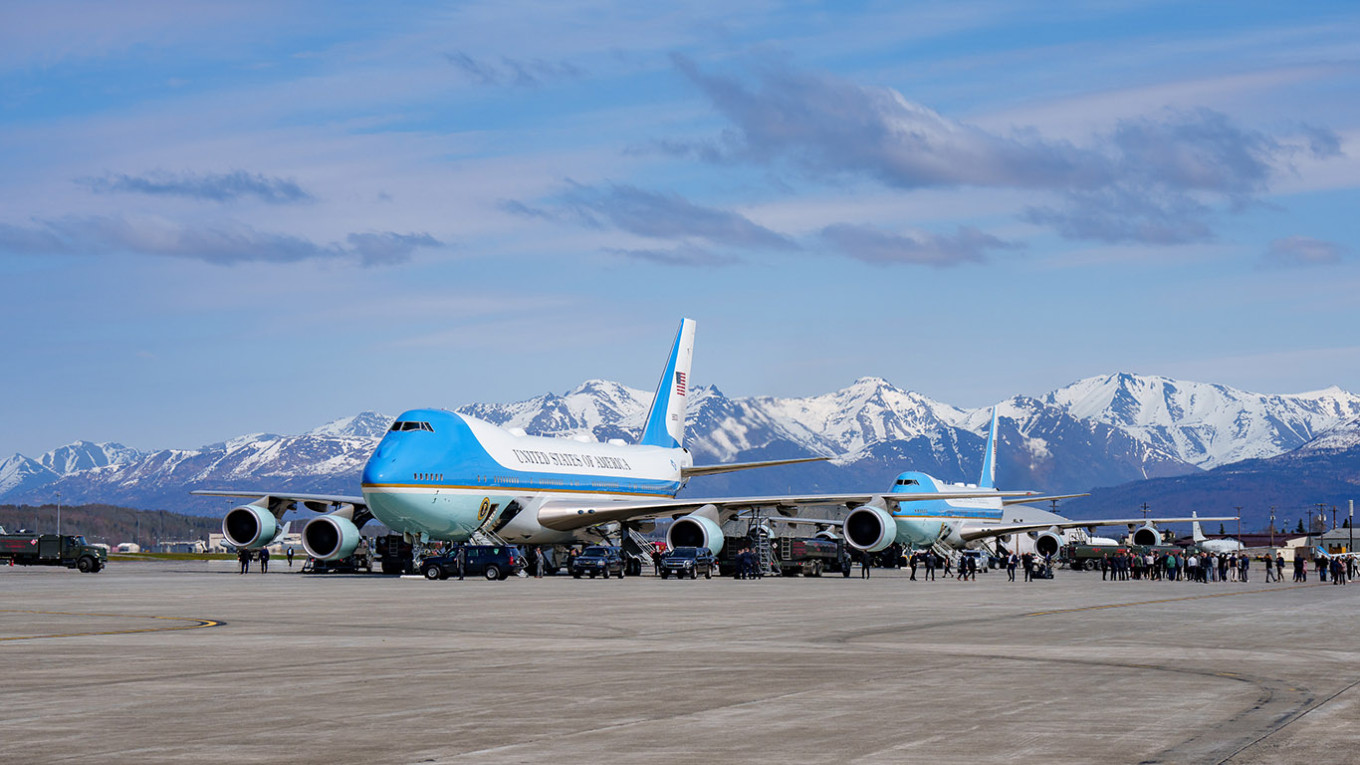U.S. President Donald Trump and Russian President Vladimir Putin are scheduled to meet at Joint Base Elmendorf-Richardson in Alaska on Friday, following the arrival of the Russian delegation on Thursday morning local time.
Each leader is bringing a high-profile group of officials to participate in the discussions alongside their personal meetings.
Let’s examine who will be present at the negotiation table in Anchorage.
**Foreign Minister Sergei Lavrov**
At 75 years of age, Lavrov has been serving as Russia’s foreign minister since 2004. Often referred to as “the frowning face of Russian diplomacy,” he is currently navigating his fifth U.S. presidential administration, amid rumors of his repeated unsuccessful attempts to retire.
The Financial Times reported that, like many high-ranking officials, Lavrov did not learn of Russia’s large-scale invasion of Ukraine until 1 a.m. on February 24, 2022.
In July, Lavrov met with U.S. Secretary of State Marco Rubio in Kuala Lumpur during the annual ASEAN forum. Rubio commented to the press that he conveyed both his and Donald Trump’s “frustration” regarding the stagnation in the peace negotiations during their discussion.
In June, Lavrov stated that Russia finds itself fighting against the entire West without allies for the first time, emphasizing the need for self-reliance without any weakness or complacency. He ruled out any territorial concessions to Ukraine as a precondition for ending the conflict.
**Kirill Dmitriev**
As Russia’s special economic envoy, Dmitriev has been pivotal in negotiations following the February 18 meeting between U.S. and Russian representatives in Riyadh.
The Wall Street Journal indicated that Dmitriev has developed a close rapport with U.S. envoy Steve Witkoff, with the two seen strolling through Moscow during Witkoff’s visits.
Born in Kyiv, Dmitriev is a graduate of both Stanford and Harvard and has previously worked for Goldman Sachs and McKinsey. After returning to Russia in 2000, he held various roles, including deputy general director at IBS and investment director at a U.S.-Russia Investment Fund established during the Clinton administration.
In January 2017, Dmitriev was reported to have met with Trump donor Erik Prince to create a connection between Trump’s transition team and Moscow, and that same month, he also met with Trump adviser Anthony Scaramucci at the World Economic Forum in Davos.
**Yuri Ushakov**
A long-time foreign policy adviser to Putin since 2012, Ushakov has held positions including Russia’s ambassador to the OSCE and the U.S., and deputy chief of staff of the government.
He has been involved in various aspects of Russian foreign policy around the globe, participating in discussions on topics including BRICS, Ukraine, East Asia, the Caucasus, the Middle East, Africa, and Europe.
Ushakov is often referred to as Putin’s “America guru,” as noted by Toby T. Gati, a former senior director of the National Security Council for Russia and Eurasia under the Clinton administration. Ushakov is expected to contribute insightful comments during the negotiations, with the breadth of discussions including “acute regional and international issues” alongside the war in Ukraine, pending the course of the talks.
**Defense Minister Andrei Belousov**
In May 2024, Andrei Belousov was appointed as defense minister, taking over from the long-serving Sergey Shoigu, who oversaw various missteps in the initial two years of Russia’s full-scale invasion of Ukraine.
Belousov, an economist and technocrat without a military background, was likely chosen for his analytical abilities and bureaucratic management experience. Analysts have labeled his appointment as “bad news for the West,” indicating an escalation in the theme of a war of attrition.
Previously, he was involved as Russia’s minister for economic development and first deputy prime minister.
**Finance Minister Anton Siluanov**
Siluanov has served as finance minister since 2011, having acted previously as an economist for the ministry and on its board.
He oversees various organizations, including Rosimushchestvo, the state property management agency that seizes and manages assets. In 2024, The Moscow Times reported that state seizures reached a record high of 544.7 billion rubles ($6.71 billion) from numerous companies in the food, real estate, and retail sectors.
Siluanov has expressed criticism towards efforts to transfer frozen Russian assets to Kyiv, stating such moves undermine the stability of the financial system when national banks’ reserves are subjected to political restrictions.
**U.S. Delegation in Anchorage**
Although Trump will also bring a significant delegation to Alaska, experts on Russia are expected to be absent from discussions. Eric Rubin, a former U.S. diplomat and ambassador to Bulgaria during Trump’s first term, highlighted that Trump lacks substantial advisory personnel familiar with Russia and Ukraine.
The Trump administration has significantly reduced staff at the State Department, laying off over 1,300 workers in July. According to a senior U.S. official familiar with the situation, traditional foreign policy processes in Washington, led by the National Security Council, have mostly broken down under this administration.
**Secretary of State Marco Rubio**
Former Florida senator Marco Rubio has gained prominence in the second Trump administration. Initially a strong advocate for Ukraine, he has shifted his stance to align more closely with the isolationist and arguably pro-Russian views of the Trump administration.
Prior to the Alaska summit, Rubio mentioned that achieving peace would necessitate discussions on security assurances and territorial disputes. He expressed hope that the meeting would provide a chance for a cessation of hostilities to enable these dialogues.
**Special Envoy Steve Witkoff**
Witkoff, once a commercial real estate mogul and a golf partner of Trump, has also taken on the role of special envoy to the Middle East. He has visited Russia multiple times since Trump assumed office, most recently the prior week.
Reports indicate that Putin offered Witkoff a complete ceasefire contingent on Ukraine withdrawing from the eastern Donetsk region. However, there have been claims that Witkoff misinterpreted Putin’s demands, leading to multiple revisions of the terms discussed.
According to a Ukrainian government official, Witkoff lacks clarity on the situation, while a former official from Trump’s administration labeled him as a “nice guy” but described him as incompetent in this role.
**Commerce Secretary Howard Lutnick**
Having transitioned from being a Trump donor to cabinet secretary, Lutnick is a prominent supporter of Trump’s tariff policies and has vocally criticized Ukrainian President Volodymyr Zelensky.
Without previous foreign policy experience, he assumed the Ukraine portfolio in February and has made headlines for his remarks following Zelensky’s contentious Oval Office meeting with Trump.
Lutnick criticized Zelensky, arguing that it was unreasonable for the president to make demands without expressing gratitude for U.S. assistance while at war with Russia.
**CIA Director John Ratcliffe**
Former acting director of national intelligence John Ratcliffe is a well-known advocate for Ukraine. He has emphasized the resilience of Ukrainian forces and their willingness to fight for their sovereignty.
Following the Trump administration’s suspension of intelligence assistance to Ukraine in March, Ratcliffe indicated that this pause would be temporary and reaffirmed U.S. commitments to support Ukraine against aggression.
**Treasury Secretary Scott Bessent**
The billionaire former hedge-fund manager will also be joining the U.S. delegation in Alaska. Bessent stated that sanctions against Russia might be increased or relaxed based on the results of the meeting, urging European allies to align their strategies.
He remarked, “It’s put up or shut up time,” suggesting that if discussions do not yield favorable results, sanctions may be intensified.

